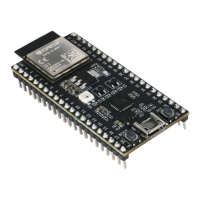Chapter 2. API Reference
(continued from previous page)
QueueSetHandle_t queue_set = xQueueCreateSet(3);
//Add ring buffer to queue set
if (xRingbufferAddToQueueSetRead(buf_handle, queue_set) != pdTRUE) {
printf("Failed to add to queue set\n");
}
...
//Block on queue set
xQueueSetMemberHandle member = xQueueSelectFromSet(queue_set, pdMS_TO_
,→TICKS(1000));
//Check if member is ring buffer
if (member != NULL && xRingbufferCanRead(buf_handle, member) == pdTRUE) {
//Member is ring buffer, receive item from ring buffer
size_t item_size;
char *item = (char *)xRingbufferReceive(buf_handle, &item_size, 0);
//Handle item
...
} else {
...
}
Ring Buffers with Static Allocation The xRingbufferCreateStatic() can be used to create ring buffers
with specific memory requirements (such as a ring buffer being allocated in external RAM). All blocks of memory
used by a ring buffer must be manually allocated beforehand then passed to the xRingbufferCreateStatic()
to be initialized as a ring buffer. These blocks include the following:
• The ring buffer’s data structure of type StaticRingbuffer_t
• The ring buffer’s storage area of size xBufferSize. Note that xBufferSize must be 32-bit aligned
for No-Split and Allow-Split buffers.
The manner in which these blocks are allocated will depend on the users requirements (e.g. all blocks being statically
declared, or dynamically allocated with specific capabilities such as external RAM).
Note: When deleting a ring buffer created via xRingbufferCreateStatic(), the function vRing-
bufferDelete() will not free any of the memory blocks. This must be done manually by the user after vRing-
bufferDelete() is called.
The code snippet below demonstrates a ring buffer being allocated entirely in external RAM.
#include "freertos/ringbuf.h"
#include "freertos/semphr.h"
#include "esp_heap_caps.h"
#define BUFFER_SIZE 400 //32-bit aligned size
#define BUFFER_TYPE RINGBUF_TYPE_NOSPLIT
...
//Allocate ring buffer data structure and storage area into external RAM
StaticRingbuffer_t *buffer_struct = (StaticRingbuffer_t *)heap_caps_
,→malloc(sizeof(StaticRingbuffer_t), MALLOC_CAP_SPIRAM);
uint8_t *buffer_storage = (uint8_t *)heap_caps_malloc(sizeof(uint8_t)*BUFFER_SIZE,␣
,→MALLOC_CAP_SPIRAM);
(continues on next page)
Espressif Systems 962
Submit Document Feedback
Release v4.4

